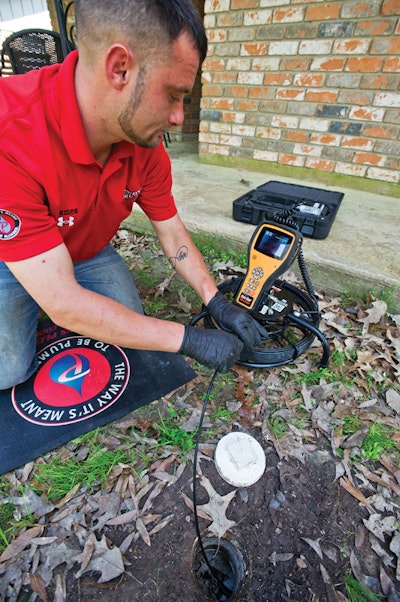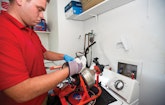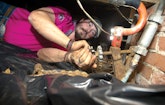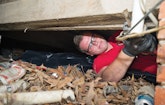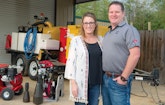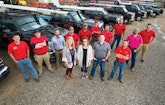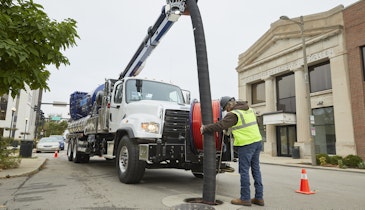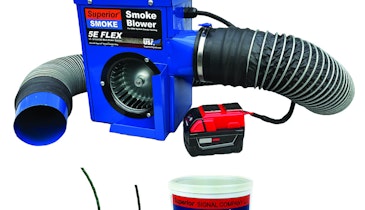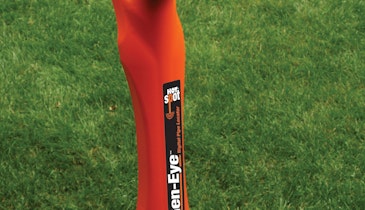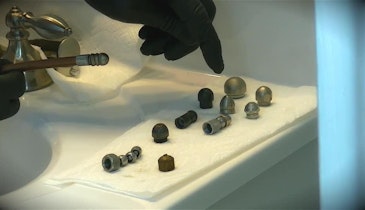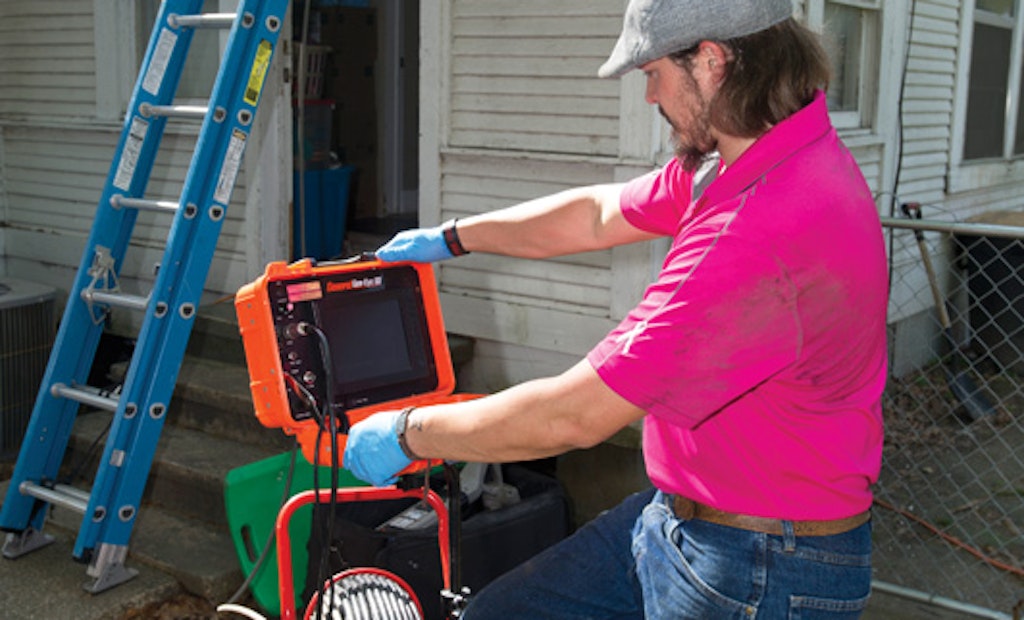
Interested in Plumbing?
Get Plumbing articles, news and videos right in your inbox! Sign up now.
Plumbing + Get AlertsDoyle Parsons woke up one morning and knew it was time to make a change.
That was 10 years ago. Parsons, a licensed plumber in Louisiana, had spent two years doing hurricane relief work in New Orleans after getting fired from his plumbing job back home. He was living in his truck, going home to see his family for 12 hours a week.
“I had just obtained my master plumber license while I was in New Orleans and then decided to come home to provide for my family,” Parsons says. “I had no clear ambition except just to provide for my family. And then after five years, we had a consistent 30 percent growth rate, at six years we were at a 40 percent growth rate, and at seven years we were at 47 percent. I wasn’t sure where to go and just started reading a bunch of books, and I then just felt like the sky was the limit.”
Today, Parsons Plumbing, Heating & Cooling has nine service trucks on the road with 11 crew members in the field and three in the office. The company generated $1.8 million in revenue in 2016.
Starting out
Parsons spent his first day back in Ball, Louisiana, making phone calls. On the second day, he had 10 hours of work, and he never looked back.
“I never turned a job down,” he says. “Even if I didn’t have the equipment I would go rent it. My very first drain job I had to go rent the equipment from Home Depot. So I rented it for a week and just prayed for work.
“I didn’t have any tools. I had no service truck — no work body — so I had to find a way to pick up a 500-pound machine and put it in the back of a pickup truck. I used a four-wheeler ramp and had to just take off running to get it up the ramp and into the back of the truck.”
Through the rental process he was eventually able to secure a line of credit and buy the Electric Eel cable machine he had been renting. He used that same machine for several more years without any problems.
The business started growing when Parsons began getting calls for water leaks, drains and broken lines underneath the slab. He would sometimes dig 10 to 15 feet under houses by himself to replace lines, and says he developed a reputation for getting the job done, no matter how big or small, or what it entailed.
“My biggest deal was that if a customer called, I always took the job no matter if I knew how to do it or not,” he says. “I just had the confidence. You always show the confidence in front of the customer that you know what you’re doing and you do the best professional job.
“I was always expanding services. I didn’t know about having a niche, I just wanted to take care of the customer if they called. I didn’t want them calling anybody else. My theory was if they call someone else then I’ve lost them. I just built on that — taking every job, no matter how big, how small, how nasty — just do it.”
Socially trenchless
Parsons says Louisiana is 20 years behind the curve on trenchless work, and his primary service area is even further behind. Nonetheless, he was aware of the opportunities it presented.
He’s the only one in his area providing pipe bursting and hydroexcavation, which are recent additions to his plumbing and drain cleaning services.
“A year and a half ago through Instagram I started seeing other plumbers from around the country pipe bursting, relining and hydroexcavating. I didn’t know anything about those three processes, and being that my driving ambition was always to be on the cutting edge and offer services that no one else offered, just on a leap of faith I went and purchased a hydroexcavating trailer (Vac-Tron Equipment) and pipe bursting equipment from Spartan Tools. I had no jobs, no use for it, never seen it. I just knew that if we were on the cutting edge, somehow, somewhere the word was going to get out.
“We hired a social media team through Facebook and they started posting for us on hydroexcavating and pipe bursting. We’ve had the pipe bursting equipment for three months and we have not done one job. The hydroexcavating though, we landed a $32,000 job just on a Facebook ad.”
Parsons did close to $58,000 in hydroexcavation business in the first three months he had the equipment, primarily through the company’s social media presence and word-of-mouth referrals.
“Everyone we come across now, they know we have the equipment,” Parsons says. “We do a lot of work for the local colleges, a lot of municipal people, so now we’re just promoting it verbally to everyone we know.”
The company recently tackled a hydroexcavation project at a local military base, with very exact requirements. They had to dig a 4-foot-deep, 4-foot-wide trench 40 feet under two separate sections of a building to replace a sewer line. It was unlike anything they’d done to date, but they were successful.
They also get called onto construction sites to locate utilities before any traditional digging begins, and have been using the equipment on their own jobs in lieu of traditional excavation equipment to prevent any utility damage. Parsons says it will dovetail nicely with pipe bursting when that picks up.
“I wanted to catch up with what the rest of the nation is doing. I wanted to get up to speed because that is the future,” he says. “That’s why I bought it.”
Parsons’ leap of faith didn’t end with hydroexcavating and pipe bursting equipment. The company is now moving into lining, based solely on the potential it represents.
“We’re actually in the process of purchasing MaxLiner equipment so we can offer total trenchless technology as a whole. It’s a big risk. I’m investing over $100,000 I don’t have, and I don’t have a job lined up,” he says. “Everything you want is on the other side of fear.”
MaxLiner will come out and provide on-the-job training and oversight of the crew on the first few lining jobs. Spartan is doing the same on the company’s initial pipe bursting jobs.
Strong leadership
Parsons gives credit for the company’s growth not to the equipment upgrades or the expanded service menu, but to something decidedly less technical in nature.
“My biggest growth period came through leadership training,” he says. “I went to a John Maxwell course to become a certified speaker and business coach. In every book I’ve read, everything rises and falls on leadership.”
The business was in a cycle — up to five employees, down to two, up to five and down to three, up to six and back down to three. Parsons says he didn’t have the capacity to effectively lead more than three employees at that time.
“I decided it was my attitude. So I actually hung a board up in our office and I assigned one person to rank my attitude every day based on what everyone else said. The first day they gauged my attitude at a 6, and one of the guys said, ‘If you’d have done this last year you’d have been at a 0 every day.’ So it took me a matter of two days to change my attitude and how I treat my people. I treat them with the utmost respect. My attitude, they say it hovers around a 9 every day. And since then, my business has been growing double every year. It’s been two years and I’ve gone from three to six to now 14 employees. If your business isn’t growing or you’re losing employees, your leadership ability is not there. … It applies to every business, every organization. Your business will not outgrow your leadership capabilities.”
Parsons also hired a business coach last year to help restructure and come up with better systems and processes. As a result, the company is on pace for 100 percent growth in 2017.
One of the notable changes is a shift to free inspections, which started at the beginning of this year. The driving force, Parsons says, was to help upsell jobs, and his General Pipe Cleaners Gen-Eye cameras have done just that.
“We put a camera in every truck that has drain equipment. In most of the area they charge you a camera fee,” he says. “We do not. After we run the drain and clear it we actually run the camera to inspect it and see if there are any issues. Then we explain to the customer what’s going on and they choose an option, whether they want to fix it, repair it or let it be. Since we’ve implemented that process we’ve taken $140 drain jobs and turned them into $2,000 jobs.
“We’re now finding that if we camera the line for free after we do the job then it actually ensures that we have no call-backs,” he adds. “So it’s actually cut our costs.”
Right now all the inspection work is residential, but Parsons recently obtained his Louisiana municipal mechanical license, so municipal work could factor into future plans.
One thing is certain, with municipal clients or without, Parsons has ambitious expansion plans.
“Ultimately, we’re trying to get to 200 locations in the next 40 years, so I’m not sure if the municipal work will fit into that scope,” he says. “I want four locations in every state in America. I have one right now and we’re looking to send a man into New Orleans soon.”
The 40-year plan, he says, is part of something bigger than himself.
“Scripture says without a vision a man perishes. So this vision will help drive and motivate me every day.”
Changing people’s lives
Doyle Parsons formed Parsons Plumbing, Heating & Cooling in Ball, Louisiana, with a focus on providing for his family. Over the course of the past 10 years, the mission has evolved.
“My biggest deal is that I want to change my team members’ lives,” says Parsons, a soft-spoken but enthusiastic entrepreneur. “I’m building my business around the concept of helping others achieve their dreams.”
Parsons has several stories of redemption among his staff. One of his plumbers was told he’d never amount to anything by another employer. Under Parsons’ wing he obtained his plumbing license and shortly thereafter ran the biggest job the company had ever taken on.
Another was a drug addict who’d been in the business for five years but had nothing to show for it. He didn’t even have a driver’s license. Now the man is in good health, licensed both on the road and as a plumber, and recently bought his first house.
“As a business owner, you have to allow your team to fail. If you cannot trust your employees to fail, you’re never going to grow. It’s called failing forward,” Parsons says. “There is no straight line to success, so you have to be willing to let your guys fail. Treat them with utmost respect. Ultimately they’re human beings. They have feelings and emotions. Each person responds differently. Make sure you’re aware of what’s going on in their home, their lives … it affects their jobs. And make sure you treat them with respect.”
